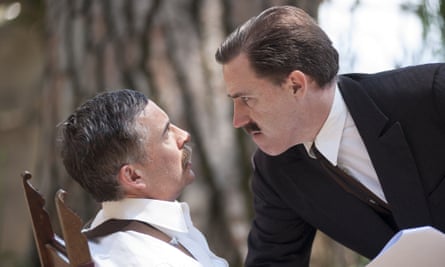How can I be a better person? For most of human history this has been an ethical question. But now it’s a technological one. This is the age of life-hacks, smart drugs, cosmetic surgery, mindfulness apps, wearable gadgets that quantify movement, productivity-enhancing software and social media, the largest infrastructure for indiscriminate boasting the world has ever seen. Old Stoic approaches to controlling one’s thoughts are updated to macho video headlines such as “How I Made My Mind My Bitch”. Crucially, the phrase “self-help”, with its unfortunate possible implications of weakness and victimhood, has been elbowed out by the engineering metaphor of “self-optimisation”.
This is now such a huge and variegated industry that, for a curious outsider, it’s difficult to know where to start. Which is where our authors come in, for they have done their readers the profound service of starting everywhere. Over the course of 2016, they each spent an entire month trying to optimise, according to the latest scientific or at least sciencey advice, one area of their lives, from productivity (in the work sense), to brain function, physical attractiveness, relationships, creativity, money, and so on. In a month, Carl Cederström scoffs smart pills, gets a personal trainer to build muscle, and learns French; André Spicer runs an ultramarathon, becomes a day trader, and goes on a man retreat.
It’s a great idea for a stunt book, and the results are written up in a tremendously enjoyable form of alternating diary entries, which importantly avoids any kind of second-guessing hindsight. We follow the adventures of each author in what seems like real time – Cederström in Stockholm, Spicer in London – and we also witness one side and then the other of their conversations about the project. The result is something like an internet-age buddy movie in which the heroes vie to outdo one another in extreme self-fashioning, and constantly trade amusing insults in the manner of the academics in Lars Iyer’s Spurious trilogy of novels. Spicer goes to a cultish self-improvement seminar and writes: “During the next break, I wrote an email to Carl asking him what he thought my blockage was. He responded with one word: yourself.”
The authors embark on the project as critics of the culture, but they do find some things that actually work for them – for instance, working in “Pomodoros”, or blocks of 25 minutes punctuated by five-minute breaks – and the analysis of this world in general gets deeper and more thoughtful as they approach the end of a very bizarre year. Cederström goes on a Zen guru’s retreat, for example, and is surprised: “Before going to the retreat I had thought of spiritual training as a middle-class indulgence. But now, after I saw the pain that these people were suffering and how desperate they were to get better, I could no longer stand on the side and laugh.”
But that’s OK, since there are still plenty of other things worth laughing about. The chapter on optimising sex, in particular, is an absurdist masterpiece: the authors’ long-suffering partners refuse to participate, so Spicer dances awkwardly at a Tantric workshop, while Cederström buys expensive masturbation paraphernalia in a glum and futile attempt to become multi-orgasmic. “I could think of many people I wouldn’t like to have sex with,” he writes, “and I was one of them.” Comedy is deployed as an analytical weapon, which is especially effective during the month the authors attempt to become better people in a moral sense (after all), by trying on philosophies such as “effective altruism”. “I was just getting into my new role as moral Carl,” Cederström reflects, “and I had already alienated my family.”

Overall, as an anatomy of modern optimisation culture the book is sharp and laconic, as readers of the authors’ excellent previous work, The Wellness Syndrome, will have expected. Late on, the authors spend a month trying to optimise “attention”, or how famous they can become on social media. Cederström decides to record his physical self-transformation on Instagram. “As I was doing my second set of bench presses, I thought about Christopher Lasch’s claim that, in the early 1970s, as people lost hope in improving the world politically, they retreated into self-improvement. It was no small irony that our year of self-improvement was also the year when both Britain and the USA had fallen apart politically.” In London, meanwhile, Spicer is thinking along the same lines. “What can you say when you are faced with a year like 2016? All words seem to be cliches. They only added to the rubble of history.”
But this book is also something more than a sparkling non-fiction analysis of cultural trends: it’s an almost novelistic account of a pleasingly sardonic friendship, to the extent where the reader wonders whether Cederström and Spicer are, like Steve Coogan and Rob Brydon in the TV comedy The Trip, deliberately playing exaggeratedly bitchy versions of themselves. “Carl Skyped,” reads one of Spicer’s early diary entries. “He was lying on a couch under a blanket. He looked pitiful. I instantly started feeling better about things. This always happens. When Carl feels bad, I feel good. Buoyed by Carl’s illness, I continued writing.” The result is that the book is both the record of a “social scientific experiment”, as they say, and a fine literary comedy of cultural criticism.
Perhaps the most interesting aspect of the self-improvement world that this account illuminates, in the end, is what so many of its most ardent followers want to do with all that increased productivity and endurance. Do they dream of revolutionising scientific understanding or making immortal art? Not really; they just want to become self-improvement gurus themselves. The logical endpoint of this curious dynamic will arrive when everyone in the world spends their time telling everyone else how to optimise their life as someone who tells other people how to improve their methods of telling other people how to improve themselves. It may sound silly, but on the other hand there would be no time for nuclear Armageddon.
- Desperately Seeking Self-Improvement is available from orbooks.com priced £18.

Comments (…)
Sign in or create your Guardian account to join the discussion